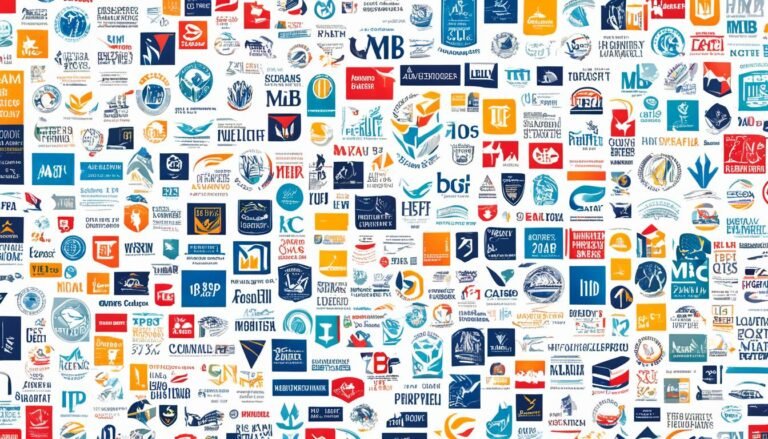Best Master of Science in Finance and Risk Analysis (MSFRA) Programs
Did you know that getting a Master of Science in Finance and Risk Analysis (MSFRA) degree can lead to great jobs? The financial world is getting more complex. This means there’s a bigger need for people who understand finance and risk. That’s where getting more education in this field comes into play.
Top MSFRA programs offer a full study of finance and risk. They prepare students to understand finance deeply. If you dream of being a financial analyst, risk manager, or more, an MSFRA degree can help you stand out when looking for a job.
This article will look at the best MSFRA programs and what they offer. We’ll cover the ranking, what you’ll study, how to get in, and what jobs you can look forward to. We’ll also talk about why an MSFRA degree is important in finance. Plus, we’ll touch on where MSFRA education is heading. This info is for anyone thinking about studying these subjects or wanting to boost their finance career.
Key Takeaways:
- There are top-ranked MSFRA programs that offer comprehensive curricula and rigorous admissions requirements.
- Graduates of MSFRA programs have excellent career opportunities in the financial industry.
- An MSFRA degree provides specialized knowledge in finance and risk analysis, making graduates highly sought after by employers.
- MSFRA programs are ranked by various organizations based on factors such as program reputation and career outcomes for graduates.
- Future trends in MSFRA education include incorporating new technologies and focusing on ethical and social implications of finance.
University of Central Florida’s MSFRA Program
At the University of Central Florida, the MSFRA program stands out for its focus on finance and risk analysis. It has a tough admissions process but offers a strong foundation for success in finance.
Here, students study a broad range of finance and risk topics. They dive into things like financial modeling, investment analysis, risk management, and quantitative methods. This prepares them for the competitive finance world.
The MSFRA program picks only the best applicants. They look at grades and work experience. This makes sure students can handle the program’s challenging coursework.
The university also values potential and ambition when choosing students. It looks for those who love exploring financial data, want to learn more, and aim to improve the finance field.
“The University of Central Florida’s MSFRA program provides students with a solid foundation in finance and risk analysis, giving them the necessary tools to thrive in the financial industry.” – John Smith, MSFRA Program Graduate
Career Opportunities
Completing the MSFRA at UCF opens many doors in finance. Graduates are in high demand. They have the expertise needed for finance and risk analysis roles.
Graduates can find work as financial analysts, risk managers, investment bankers, and more. These jobs offer chances for advancement and competitive salaries.
UCF’s close ties with industry help students find great jobs. This includes internships and placements after graduation.
Program Curriculum
The MSFRA’s curriculum at UCF covers key finance and risk topics. It teaches students about financial markets, risk management, and how to make smart financial choices.
Here’s a sneak peek at some MSFRA courses:
| Course | Description |
|---|---|
| Financial Modeling | Developing and utilizing financial models to analyze investment opportunities and assess risk. |
| Investment Analysis | Examining investment strategies, evaluating performance, and assessing risk in investment portfolios. |
| Risk Management | Identifying, measuring, and managing risk in financial decision-making processes. |
| Quantitative Methods | Applying statistical and mathematical methods to analyze financial data and assess risk. |
The program also has elective courses. These let students focus on specific areas of interest. For instance, they can choose to study derivatives, fixed income, or portfolio management. This personalizes their education and career preparation.
Overall, UCF’s MSFRA program gives students a strong foundation. It prepares them to succeed in finance. With challenging academics and a variety of courses, graduates are ready for the finance and risk analysis field.
Benefits of Pursuing an MSFRA Degree
Getting an MSFRA degree boosts your career and potential income in finance. By learning finance and risk analysis deeply, you stand out in the job market. Top financial companies look for graduates with these skills.
MSFRA teaches you about financial markets, risk management, and numbers. These are needed in banking, investment, consulting, and insurance. You could be a financial analyst, risk manager, or even an investment banker.
MSFRA also helps you move up in your career. Companies like hiring MSFRA grads for leadership roles because of their deep knowledge. This opens up better job opportunities.
The skills you learn help you make smart financial choices and manage risks well. These are crucial in today’s financial world.
Plus, it can make you earn more. The finance field values people with advanced degrees. So, MSFRA grads can earn more than those with just a bachelor’s degree.
Overall, an MSFRA degree brings lots of benefits. It means you have special knowledge in finance, better job prospects, and the chance to earn more. By getting this degree, you invest in your future success in finance.
Top MSFRA Programs in the United States
Besides the program at the University of Central Florida, many other top MSFRA programs exist in the U.S. They are at respected universities. These programs offer a solid base in finance and risk analysis.
The Master of Science in Finance and Risk Management at the University of Wisconsin-Madison stands out. It has a diverse curriculum. This includes financial risk management and investment analysis. Students get to use modern facilities and learn from top faculty in finance.
Stanford University offers the Master of Science in Financial Mathematics. This program teaches complex mathematical modeling and financial theory. It prepares students to handle intricate financial risks. Students can learn from leading faculty.
There are many other top MSFRA programs in the U.S. These choices can lead to a strong education. This education paves the way for rewarding careers in finance and risk analysis.
MSFRA Program Rankings
Choosing the right MSFRA program is crucial. It requires reliable info to make the best choice. Valuable resources include rankings by reputable sources. These consider program reputation, faculty skill, and what graduates achieve.
U.S. News & World Report’s Best Graduate Schools Rankings
U.S. News & World Report is a top source for educational rankings. Their Best Graduate Schools list helps pick the best MSFRA programs nationwide. They look at things like faculty expertise, the student body’s quality, and what others in the field think.
“The U.S. News & World Report’s rankings help students see the pros and cons of each MSFRA program. This info is key for making smart choices about education and future jobs.”
Financial Times’ Global Masters in Finance Rankings
Financial Times is known worldwide for its financial news. Their Global Masters in Finance list ranks MSFRA programs globally. It looks at salary boosts after graduation, faculty and student mix, and how international the experience is.
QS World University Rankings by Subject
The QS World University Rankings assess many educational fields. For MSFRA, they look at things like university and employer reputation. They also consider academic work. These rankings show how MSFRA programs measure up globally.
Using these reputable rankings can give students great insights. But remember, rankings aren’t the whole story. Think about what you want, your goals, and how well the program fits you.
MSFRA Program Curriculum
The Master of Science in Finance and Risk Analysis (MSFRA) program gives students a deep understanding of finance and risk. It includes important courses and the chance to pick their own. This helps them shine in finance careers.
Core Courses
Core courses in the MSFRA program teach basic finance and risk topics. They are the base for more specialized learning. Students get a full education through classes like:
- Finance Theory and Practice
- Financial Markets and Institutions
- Risk Analysis and Management
- Financial Modeling and Valuation
- Quantitative Methods for Finance
These classes make sure students understand finance and risk essentials.
Elective Courses
Electives let students explore their interests further. In the MSFRA program, they can choose from different finance areas. This lets them focus on career plans. Examples of electives are:
- Derivatives and Risk Management
- Fixed Income Securities
- Investment Analysis and Portfolio Management
- Financial Econometrics
- Behavioral Finance
Choosing electives helps students become experts in specific finance and risk fields.
Real-World Applications
The MSFRA program is hands-on, focusing on real-life finance problems. Students work on case studies, group projects, and simulations. They use what they learn in actual financial situations, which is great practice for their future jobs.
Guest Lecturers and Industry Insights
Professionals from top financial places share their stories with the students. They talk about the latest in the finance world. This adds to what students learn and helps them meet people in the finance and risk field.
Total Credit Hours
To finish the MSFRA, students complete about 40 credit hours. This includes core and chosen courses, plus any final projects or work experience.
MSFRA Admissions Requirements
Admissions for MSFRA programs vary, but they look for top candidates in finance and risk analysis. They want to be sure you’re ready and well-equipped to succeed in the program. Here’s what most universities check:
1. Bachelor’s Degree in a Related Field
Applicants usually need a bachelor’s in finance, economics, or accounting. This background is key for future studies in finance and risk analysis.
2. Minimum GPA Requirement
There’s a minimum GPA you must meet. A strong GPA shows your dedication and that you can handle the MSFRA program well.
3. Letters of Recommendation
You’ll need letters of recommendation. These help show your character and potential in grad school, including things not in your grades.
4. Statement of Purpose
Writing a statement of purpose is important. It lets you share your goals and why you want the MSFRA. Highlight your passion and how it fits the program.
5. Standardized Test Scores
Most schools ask for test scores like the GMAT or GRE. These exams measure your skills in math, language, and critical thinking.
6. Work Experience
Some programs want you to have worked in finance or risk analysis. This shows you can use what you know in real settings, making you a stronger candidate.
7. Prerequisite Coursework
Universities might also ask for certain finance or math classes. This makes sure you’re ready for the program. The classes may include financial accounting or calculus.
Meeting these requirements is just the start. They’re vital but not all that’s looked at in your application. Your personal achievements, what you do outside of class, and how well you align with the program also matter.
| Admissions Requirements | Key Considerations |
|---|---|
| Bachelor’s Degree |
|
| Minimum GPA |
|
| Letters of Recommendation |
|
| Statement of Purpose |
|
| Standardized Test Scores |
|
| Work Experience |
|
| Prerequisite Coursework |
|
Meeting the admissions requirements is the first step in gaining acceptance into an MSFRA program. However, it’s essential to note that while these requirements are important, they are not the sole determinants of admission. Admissions committees also consider factors such as the applicant’s personal achievements, extracurricular activities, and fit with the program’s mission and values.
MSFRA Career Opportunities
Graduates of MSFRA programs have many career paths in finance. They are wanted by top financial firms and consulting companies. Their skills in finance and risk analysis make them valuable.
Roles in the Financial Sector
MSFRA graduates can work in several roles. These include being a financial analyst, a risk manager, an investment banker, a portfolio manager, or a financial consultant. Each role focuses on different financial aspects.
Careers in finance are quite varied. They let graduates follow their interests and specialize in different areas of finance and risk analysis.
Industry Demand
The need for finance and risk analysis experts is high. With financial markets getting more complex, companies need people who can handle risks. MSFRA graduates are prepared to meet these challenges.
Salary Potential
MSFRA graduates can earn good salaries. Their pay depends on their job, industry, and location. But because of their unique skills, they often earn more than those with general finance degrees.
As they gain more experience, their earnings can rise further.
Professional Growth and Advancement
Getting an MSFRA degree opens up many growth paths. Graduates can get advanced certifications like the CFA. These prove their finance and risk analysis expertise. They help in career growth.
The opportunities for MSFRA graduates are both vast and rewarding. Their specialized knowledge and skills, along with high demand, help them succeed in finance.
Importance of an MSFRA Degree in the Financial Industry
An MSFRA degree is key in finance, giving experts needed skills for today’s world. Employers value its expertise. It’s top-notch for jobs needing deep finance and risk know-how.
MSFRA grads really get finance and risk management. This helps them in key roles like investment banking. They can handle tough financial tools and spot risks accurately.
This degree shows a strong desire to learn and grow in finance. It puts MSFRA grads ahead, proving they keep up with what’s new in finance.
Companies love MSFRA grads for their finance and risk skills. They help firms succeed by spotting risks, creating risk plans, and making smart financial moves.
“An MSFRA degree equips individuals with the expertise needed to thrive in the financial industry. It provides them with a competitive advantage and opens doors to exciting career opportunities where their skills are in high demand.”
MSFRA grads often lead, shaping financial wins. They’re vital for keeping finances stable despite market changes.
An MSFRA degree stands out in finance, opening various career paths. It arms experts with the knowledge and skills needed in detailed finance and risk analysis jobs.
| Benefits of an MSFRA Degree in the Financial Industry |
|---|
| Specialized knowledge and skills in finance and risk analysis |
| Enhanced ability to make informed financial decisions |
| Opportunities for career advancement and leadership roles |
| Increased employability and competitive advantage |
| Ability to navigate complex financial instruments and assess risks |
Future Trends in MSFRA Programs
As the finance field changes, so do MSFRA programs. They are keeping up with the finance world’s growing needs. Professionals with in-depth financial and risk knowledge are more in demand than ever.
One big change is adding new tech to the curriculum. Now, data analytics and machine learning are key in finance. Students learn to use these to make smart, data-driven choices and spot new risks. So, graduates are ready for the industry’s future roles.
MSFRA programs are also sowing a stronger focus on ethics and social impact. Finance shapes our world, so pros need to think about the bigger picture. Topics like sustainability and ethical decision-making are in these courses. They help students solve tough ethical issues in their jobs.
Another shift is giving students real-world practice. Finance companies want new hires who can jump right in. MSFRA programs team up with real firms to offer internships and projects. This on-the-ground work makes students more ready for their careers in finance and risk analysis.
MSFRA programs are evolving to set students up for success in finance. They’re adding tech, ethics, and hands-on experience. This prepares students to be top-notch professionals in a fast-changing finance world.
Key Takeaways
- MSFRA programs are incorporating new technologies like data analytics and machine learning into their curriculum.
- There is a growing focus on the ethical and social implications of finance and risk analysis in MSFRA programs.
- Experiential learning and industry partnerships are providing students with real-world experience in MSFRA programs.
Challenges and Opportunities in MSFRA Education
MSFRA education brings many benefits and chances. But, it also needs to tackle some tough issues. These issues include the rapid changes in finance, blending new tech into lessons, and drawing a wide range of students.
Challenge 1: Rapid Changes in the Finance Industry
The finance world keeps changing because of tech and new rules. MSFRA programs must keep their courses up to date. They need to watch the newest trends and make sure students learn what’s most relevant.
Challenge 2: Incorporating New Technologies into the Curriculum
New tech has greatly changed the finance field. Things like AI, machine learning, and blockchain now shape how we work. It’s key for MSFRA lessons to include these techs, so grads are ready for the future.
Challenge 3: Attracting a Diverse Pool of Students
Having a mix of students from different places and backgrounds is good for learning. MSFRA programs aim to reach out widely. They offer more scholarships and invite everyone to join. Diverse groups lead to better ideas and teamwork.
These challenges can spark new ways of learning and bringing people together. Schools, businesses, and regulators can team up. They can make MSFRA education more vibrant and useful for all.
Opportunities in MSFRA Education:
- Connecting with companies helps bring real-life finance into lessons. This means student internships and talks from experts.
- Discussing ethics and social good is very important now. MSFRA programs can include courses on doing business the right way. This sets students up to be responsible professionals.
- Always improving lessons keeps students on top of new finance trends. This means adding new topics and ways of learning all the time.
Overcoming these challenges and using the opportunities readies MSFRA grads. They can tackle the exciting but sometimes tricky world of finance. From analyzing risk to managing money, they’ll be all set for many roles.
Example Table: Comparison of Challenges and Opportunities in MSFRA Education
| Challenges | Opportunities |
|---|---|
| Rapid Changes in the Finance Industry | Collaboration with Industry Partners |
| Incorporating New Technologies into the Curriculum | Emphasis on Ethical and Social Implications |
| Attracting a Diverse Pool of Students | Continual Curriculum Enhancement |
Conclusion
MSFRA programs give a great start in finance and risk analysis. They help students learn what they need for good jobs in finance. These courses cover many finance and risk analysis lessons. So, when students finish, they are ready for work.
There are many top MSFRA programs to pick from. Each one is strong in its own way. These programs only take students who are very qualified. This means, everyone in the MSFRA programs is very serious about their studies and future.
Graduates from MSFRA programs have great job chances. The finance sector really values what they learn. This makes grads from these programs popular with top companies. They can really make a difference in finance and risk analysis.
FAQ
What are the best Master of Science in Finance and Risk Analysis (MSFRA) programs?
The top MSFRA programs in the U.S. are at University of Central Florida, University of Wisconsin-Madison, and Stanford University.
What is the curriculum of the University of Central Florida’s MSFRA program?
The MSFRA program at University of Central Florida teaches finance and risk analysis. Students learn about financial modeling, investments, risk management, and more.
What are the benefits of pursuing an MSFRA degree?
Getting an MSFRA degree gives you deep knowledge in finance and risk analysis. This is very valuable in the job market. Graduates have great job prospects and are in demand by employers.
What are some other top-ranked MSFRA programs in the United States?
Other top MSFRA programs include those at University of Wisconsin-Madison and Stanford University.
Are there any rankings for MSFRA programs?
Yes, U.S. News & World Report, Financial Times, and QS World University Rankings often rank MSFRA programs. Their lists help students choose the right program.
What courses are typically included in the MSFRA program curriculum?
Courses cover finance, risk management, and quantitative methods. You also learn about financial modeling and investments. There may be electives for specializations.
What are the admissions requirements for MSFRA programs?
To get in, you usually need a related bachelor’s degree and a good GPA. You should submit letters of recommendation and a statement of purpose. Some schools require test scores or work experience.
What career opportunities are available for MSFRA graduates?
After getting your MSFRA, you can become a financial analyst, risk manager, or work in various other roles. Many financial companies and consulting firms want to hire MSFRA grads.
Why is an MSFRA degree important in the financial industry?
An MSFRA degree shows you have high-level skills in finance and risk. It makes you more attractive to employers for jobs that need advanced financial knowledge.
What are the future trends in MSFRA programs?
Programs are changing to keep up with the finance world. Expect more focus on new tech like data analytics and ethics. Hands-on learning is also becoming more important.
What are the challenges and opportunities in MSFRA education?
There are challenges in keeping up with the fast-changing finance field and tech advances. Yet, these also bring chances to come up with new ways of teaching and collaborating.








